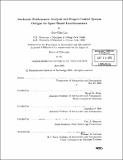Stochastic performance analysis and staged control system designs for space based interferometers
Author(s)
Liu, Kuo-Chia, 1973-
DownloadFull printable version (26.90Mb)
Other Contributors
Massachusetts Institute of Technology. Dept. of Aeronautics and Astronautics.
Advisor
David W. Miller.
Terms of use
Metadata
Show full item recordAbstract
Space based interferometry missions have the potential to revolutionize astrometry, providing observations of unprecedented accuracy. Realizing the full potential of these interferometers poses several significant technological challenges. One of the most significant challenges is regulating the light pathlength, from the collecting telescopes to the combining instrument, with nanometer accuracy, despite the presence of vibration induced by internal and external disturbance sources. Due to the wide range of disturbances that act on the optical instruments, a single actuator with simultaneously large control authority and high bandwidth would be necessary to meet the stabilization requirements. Unfortunately no single actuator can meet these requirements. Therefore, a suite of actuators with overlapping strokes and bandwidths is employed; such a construction is termed a "staged actuation system." The objective in the thesis is to develop "staging control" strategies that specify how to utilize the individual actuators in a staged system to satisfy the stabilization requirements. The first task in the staging control design process is to evaluate how actuator capabilities and constraints affect the system performance. Two analytical techniques, based on stochastic Lyapunov and stochastic linearization methods, are utilized to predict the steady-state, closed-loop performance in the presence of actuator nonlinearities such as saturation and quantization. These nonlinearities can severely restrict the achievable performance, and careful consideration of their effects is vitally important for staged controller designs. (cont.) Using this performance prediction methodology, a control synthesis framework is developed which extends [Eta]-optimization techniques by incorporating the effects of actuator nonlinearities. The newly developed framework is then proposed as a formal synthesis tool for staging controller designs. The proposed technique estimates and can directly shape the probability of saturation of each actuator, and determines optimal "hand-offs" of control authority between the actuators. Due to the [Eta]-setting, the controller designs arise directly as solutions of the corresponding necessary conditions, allowing system design studies to be performed easily and quickly. The proposed staged controllers have been demonstrated to achieve the nanometer level stabilization requirements under the expected disturbance environments for space interferometers. The new synthesis technique is also used to analytically quantify the achievable performance and the sensitivity of a particular staging configuration to the individual actuator parameters (size and bandwidths).
Description
Thesis (Ph. D.)--Massachusetts Institute of Technology, Dept. of Aeronautics and Astronautics, 2003. Includes bibliographical references (p. 219-224).
Date issued
2003Department
Massachusetts Institute of Technology. Department of Aeronautics and AstronauticsPublisher
Massachusetts Institute of Technology
Keywords
Aeronautics and Astronautics.